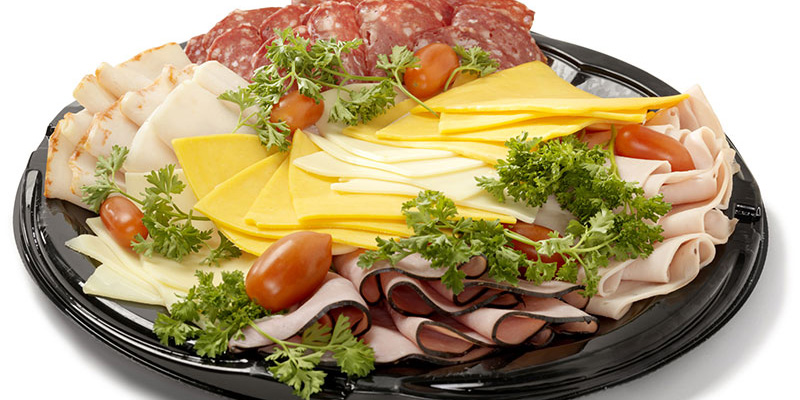
This Deli Tray Is Unacceptable
December 14, 2023
Say you are having some people over to your house to watch a football game, so you go to the grocery store to get a deli tray. Nothing fancy—one of those cheap round circular plastic containers with sliced-up ham, turkey, and cheese.
You look at the price: $16. Hmm… didn’t that used to be $9? Upon further inspection, the portions of ham, turkey, and cheese are much smaller than they used to be, and you’re mostly paying for a $16 plastic tray.
THIS DELI TRAY IS UNACCEPTABLE!
Well, that’s called inflation, and everyone is familiar with it by now. I’m sure you’ve had this experience where you go to the grocery store, fill up half a cart of groceries, and it comes out to $230. I hate to be the one to say, “I told you so,” but throughout the 2010s, I was writing about how food was so cheap, and heaven help us if we ever got any actual food inflation.
In case you didn’t know, food prices are up about 40% since pre-pandemic. And food is where people feel inflation the most. There is not much you can do to protect yourself against higher food prices. There is an agriculture ETF and a livestock ETF, but there is only a weak correlation between the prices you see at the grocery store and the prices of the underlying commodities.
Really, the best way to hedge against rising food prices is to buy more and store it in your house if you have the space. I know some people who have a whole freezer full of meat in their garage. Honestly, not a terrible idea.
Anyway, I wouldn’t spend too much time thinking about ways to protect yourself from inflation. First off, the rate of inflation has tumbled. It may rise again, of course, in which case you might want to invest in things that could potentially benefit from inflation, like gold and other commodities. But if you’re not experienced in investing in gold and other commodities, then you’ll just end up with inflation and losses. Better to leave it to the experts.
Price Taker
The way to think about this is that you are a price taker—you do not have much control over what you spend, and your demand is inelastic. You’ve gotta eat, so you will buy food no matter what it costs. Let’s say in 2019, you spend $150 on food every week, or $7,500 annually, which represented 10% of your income. Now it’s 15% of your income. My advice is to go make more income, which is what I tell people in my new book, No Worries.
I already know that I am going to be accused of being tone-deaf, but making more money is an option that is always available to you—even if you’re just delivering pizzas or selling stuff on Etsy. There are 24 hours in the day. My guess is that you are only using about seven of them.
I mean, you could hurf and blurf and grow outraged about Trump or Biden or whoever’s fault this is—and yes, there is plenty of blame to go around—or you can scramble and adapt and overcome.
The point here is that you have two choices when faced with inflation and a loss of purchasing power: You can cut expenses to the bone, or you can go out and make more money. Which one is more fun? That’s broadly true whether there’s inflation or not. An elegant solution to the problem of not having enough money is… to make more money. There is only so much generic soup you can buy.
Not too many people have read my book yet, just the folks I sent it to for blurbs, who are mostly Wall Street people. And I can tell you that the Wall Street folks really like the book because it’s the first book that says to stop smuggling candy into movie theaters, to get a second job, and to make more money. That’s what Wall Street people do.
Some have a low opinion of Wall Street people; after having worked there for a decade, I can tell you that they have the right approach to a lot of things in life (but not everything). It will be interesting to see what happens when Joe Shlabotnik gets his hands on the book and gets the tough love about getting off the couch.
Inflation sucks. I think we will get more of it in a couple of years. Not to get too policy-wonky on you, but for years, the Federal Reserve was more worried about deflation than inflation. I was like, why the hell are you worried about deflation? In deflation, people band together. Look at Japan—30 years of deflation, and it’s a peaceful and productive society.
Inflation, on the other hand, rips society apart. Inflation isn’t merely a risk to the economy—it’s a risk to civilization itself.
Order the book here:
Jared Dillian, MFA

Most popular upgrades from The Jared Dillian Letter…
Heartland Investor: Jared’s newest premium service. Built for investors who want to start building wealth deliberately, durably, and without the hype.
Each month, Jared and his long-time analyst Adam Crawford bring you one undervalued stock with a strong balance sheet, wide moat, and room to run. Designed for thoughtful, fundamentals-first investors who want a portfolio that can last.

The Daily Dirtnap: Jared’s macro newsletter for investing professionals. This daily letter takes a top-down approach, looking at the various asset classes, including stocks, bonds, currencies, and commodities. Join over 4,000 readers who read his market insights every weekday.


Street Freak: As the most active of Jared’s portfolio products, Street Freak is an aggressive stock-picking newsletter. It’s written for astute investors who crave creative, fresh macro analysis and forward-looking trade ideas so they can invest more opportunistically, without much hand-holding along the way. Adjusted for risk, of course.
